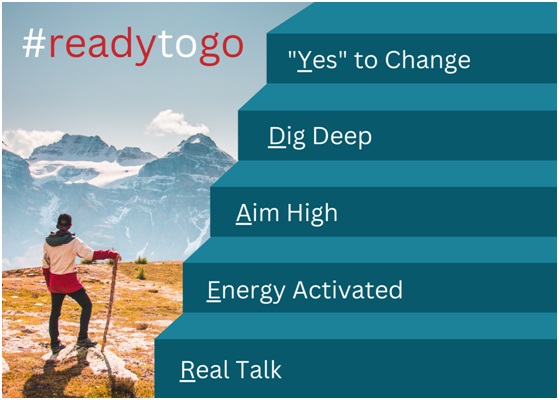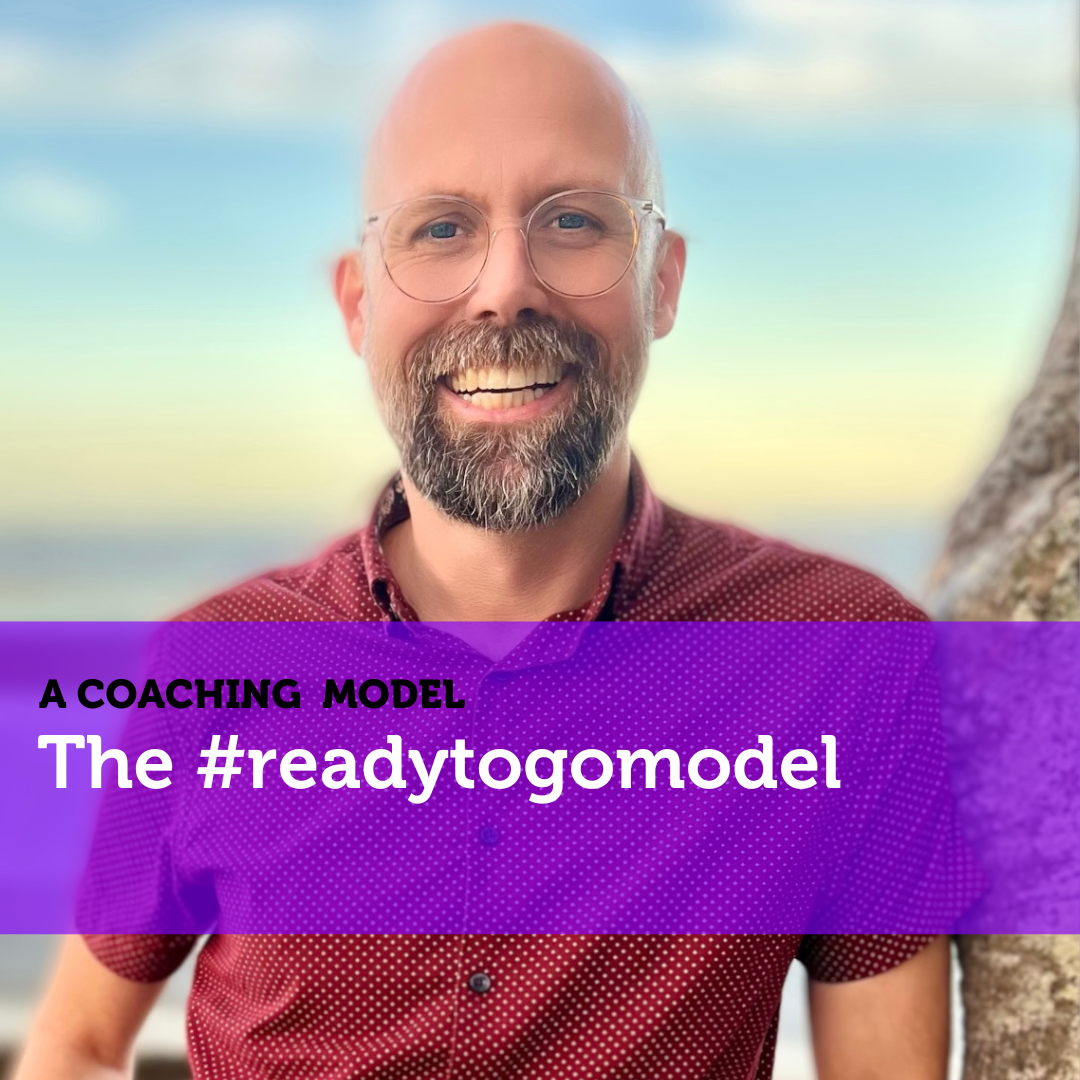A Coaching Model By Benny Callaghan, Leadership and Life Coach, AUSTRALIA
The #readytogomodel A Coaching Model for Teens and Young Adults

The #readytogo coaching model was originally designed for teens and young adults, introducing key coaching principles while stripping away jargon and keeping it real. As I’ve shared this with coaching peers, I’ve discovered the simplicity of the principles can work for any audience.
One of the aims of creating the model this way is so it can be taught to teens so that be able to use this model with their peers. Teens will be able to teach this and use it with their younger peers, making it a powerful tool for being good mentors.
The #readytogomodel
READY is an acronym:
- Real talk
- Energy Activated
- Aim High
- Dig Deep
- “Yes” to Change

Real Talk
Honesty is important for coaching to have transformative effects. Sometimes, asking teens to ‘open up’ and share how they feel can be a challenge. Connecting with authenticity or being real’ is a way of creating a safe space for this to happen.
Teens value authenticity and speaking plainly. Real talk provides a safe and non-judgmental space for the client to bring whatever they need to the coaching session and figure out their session goal.
Real talk invites the client to share in their own terms, using their language and without concern for how they might be interpreted (or misinterpreted) is important. It’s a way of saying, however, you show up is okay.
This part of the process is about getting a real and accurate picture of the client’s current situation. As the #readytogo model isn’t linear, this may be something that the coach returns to throughout the session.
Energy Activated
In a growth mindset, people believe that their most basic abilities can be developed through dedication and hard work—brains and talent are just the starting point. This view creates a love of learning and a resilience that is essential for great accomplishment. (Dweck, 2015)
Success is not an accident; success is a choice.—Stephen Curry
In my experience working with teens, goals need to be more than polished statements on a piece of paper. The emotional or energetic dimension of goal setting is vital for activating the self-motivation required to move forward. So, when talking about goals or where the client wants to move towards, a key element will be asking “How do you want to feel?” or “What energy will be required to bring that goal to life?”
Coaching and change require a growth mindset. This is all about activating one’s energy for change and growth.
At this stage, the client doesn’t need to know what they want to change or act upon. Simply being in a state of receptivity and openness can be enough.
If there’s a sense of frustration with their current situation, the energy of “enough is enough” or “I don’t want to keep going like this” can be powerful to catalyze a creative exploration into possible options.
Aim High
Aiming High is about defining and clarifying the goal of where the client wants to land or end up.
It encourages the client to aim for the very highest expression of any goal they set for themselves. Sometimes awareness of what is possible may be out of sight, so part of this will be inviting the client to explore this in a multi-sensory way and moving beyond any perceived limitations.
I have found these questions helpful:
- If you could make your goal even more powerful than it already is, how would you describe it?
- If you could remove all limitations from your goal, how might you take it even higher?
- What will others see or witness in you once you’ve achieved this goal?
Dig Deep
Digging deep seeks to identify what needs to be addressed to move towards the goal.
Great coaching invites clients to get below the surface of any issue. It invites the client to explore underlying beliefs or become aware of what might be holding them back from reaching their goals.
While the #readytogo model isn’t sequential, digging deep requires safety, trust, and a growth mindset. Spending time engaged in real talk and activating energy will help invite the client into a space where they will want to dig deep.
I find teen clients think deeply about their challenges and opportunities, especially if the situation or goal is significant to them.
“Yes” to Change (and “No”)
This is the action step. It invites the clients to consider what opportunities they can say “Yes” to. Teen and young adult years are partly about gathering new and helpful life experiences. This can mean stepping outside one’s comfort zone and trying or exploring new things.
Adopting an attitude of saying “yes” to new opportunities encourages this.
It is also important to acknowledge that saying yes to one thing may also mean saying “no” to something else. Questions might include:
- What new experiences might help you move towards your goal?
- What might be holding you back from (or getting in the way of) achieving your goal?
- Is there anything you could consider saying no to in order to move towards your goal?
Saying yes to change is also the place to consider what structures and supports the client may need to succeed at their goal.
Super-Charging the #Readytogo Model
The READY model is designed as a session framework. It doesn’t specifically address some other key aspects that are important when working with teens and young adults. Here are several I’ve worked with:
- identification of strengths or what you’re good at
- knowing your values or what matters to you
- support structures or setting yourself up for success
Weaving these ideas into a session will help take the #readytogo model to another level. As I’ve done with the rest of the model, the language is deliberately upbeat, jargon-free, and accessible to teens.
What You’re Good At
It can be easier for adults to be able to identify their strengths. For teens and young adults who haven’t had the opportunities to discover, explore, or develop their talents, this process can be more challenging.
Traditional school-based education typically provides a narrower band of opportunities to discover strengths. Young people who are inclined towards academic subjects, especially language, mathematics, and science, are often able to identify their strengths earlier and more easily.
There are several strengths less developed in school-based education, which coaching provides a golden opportunity to acknowledge and explore:
- Self-awareness and intrapersonal understanding
- Interpersonal skills: empathy, communication, relationship building
- Instinctual Intelligence
- Leadership skills
- Strategic and synthesizing thinking (in contrast to analytical thinking)
Here are two ways to bring strengths into a coaching program with young people:
- VIA Institute on Character (viacharacter.org) is a great tool for exploring and identifying character traits young people may not have previously thought about as strengths.
- Listen to and observe natural abilities in a client and make powerful acknowledgments of the ability. This helps the client recognize the strength in real-time and gain language to describe an ability they may not have previously been aware they have.
What Matters to You
In our younger years, our values are often shaped by our families. As we move into our teen and young adult years, we started to explore and tap into values that are unique to us as individuals. Indeed, values can change as we move through different life stages. Coaching offers a wonderful opportunity for people to become aware of what they value.
Again, well-placed acknowledgments can be a powerful way of helping young clients become aware of what they already feel. For example, “Kai, I’m hearing your independence really matters to you right now.” It helps build empathy and trust between coach and client, while also bringing their values to conscious awareness.
Setting Yourself up for Success
One of the biggest challenges young people face in the transition from school to adult life is the loss of structure. Schooling provides an external structure largely dictated by a system or organization (timetables, deadlines, clear parameters, and the guidance of teachers). Yet it is often not referred to as what we know in the coaching world as ‘structure.’
The structure is essential for success and a vital life skill to develop and continually refine. It helps us be accountable for our goals. The big shift that happens in this life stage is a movement from an external locus of control (success determined by outside forces) to an internal locus of control (self-responsibility for what happens to us).
This is key to success in coaching and in life. Helping young clients develop these skills and the associated thinking and feeling that goes with it is vital to any coaching engagement.
Another aspect of support that is vital to life is having a good support team. Teen and young adult years can be confusing and isolating. Being conscious about who is part of our network is important as we as working to expand our network the way of new connections and mentors.
The #readytogomodel Presents Coaching Principles
- The #readytogo model is an easy-to-remember framework that presents coaching principles in an engaging, authentic, and jargon-free way.
- These principles are not linear and can be fluidly explored or scaffolded throughout a session.
- The model can be supercharged by inviting young people to explore essential keys to success: strengths, values, and support structures.
Learn How to Create Your Own Coaching Model
Your Coaching Model reflects your values,
philosophies, and beliefs and must communicate who you will coach
and the problems you will solve. Read more about creating your coaching model
Dweck, Carol (2015). Mindset: Changing the Way You Think to Fulfil Your Potential—Little Brown Books.
